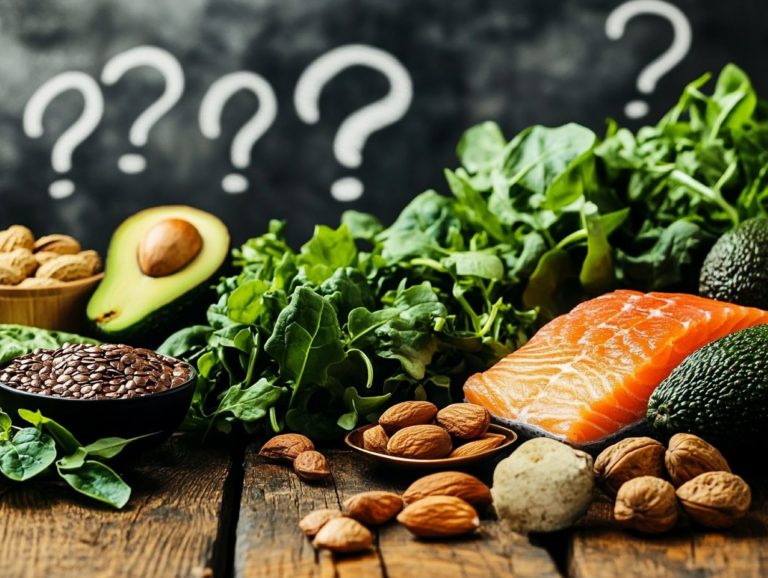Keto Diet and Weight Loss: Frequently Asked Questions
Curious about the Keto diet? This popular weight loss strategy not only transforms how your body processes energy but also opens the door to a variety of delicious foods. But what does it truly entail?
This article delves into the essentials of the Keto diet, revealing how it promotes weight loss through the production of ketones, and highlighting the delightful array of keto-friendly foods you can savor.
You’ll also discover what to steer clear of, the numerous benefits of embracing this low-carb lifestyle, potential health risks involved, and whether the Keto diet can be a sustainable choice for the long haul.
Ready to discover how Keto can transform your health? Let s dive in!
Contents
- Key Takeaways:
- What Is the Keto Diet?
- How Does the Keto Diet Work for Weight Loss?
- What Foods Should You Avoid on the Keto Diet?
- What Are the Benefits of the Keto Diet for Weight Loss?
- The Benefits of the Keto Diet
- Are There Any Risks or Side Effects of the Keto Diet?
- How Long Should You Follow the Keto Diet for Weight Loss?
- Can You Exercise While on the Keto Diet?
- Is the Keto Diet Safe for Everyone?
- Is the Keto Diet Sustainable for Long-term Weight Loss?
- Frequently Asked Questions
- What is the Keto Diet?
- How does the Keto Diet promote weight loss?
- Is the Keto Diet safe for everyone?
- What foods are allowed on the Keto Diet?
- Can I still exercise while on the Keto Diet?
Key Takeaways:

- The Keto diet is a low-carb, high-fat diet that promotes weight loss by causing the body to enter a body s energy process called ketosis. This is achieved through specific dietary changes that focus on reducing carb intake.
- Key to weight loss on the Keto diet is the production of ketones, which are compounds that help burn fat for energy instead of glucose.
- The Keto diet emphasizes whole, unprocessed foods such as meats, fish, vegetables, and healthy fats, while restricting high-carb foods like grains, sugar, and starchy vegetables. This approach ensures you get the necessary macronutrients while maintaining ketosis.
What Is the Keto Diet?
The Keto diet, or ketogenic diet, is an exquisite low-carb, high-fat eating plan meticulously crafted to usher your body into a state known as nutritional ketosis. In this state, your body primarily relies on fat for energy instead of carbohydrates, making it a powerful weight loss strategy.
By significantly slashing your carb intake and elevating your dietary fat consumption, you’ll initiate a remarkable transition where your body begins to burn fat for fuel, resulting in elevated ketone levels in your bloodstream. This transformative shift can have profound effects on your weight loss journey and overall health, as your body becomes increasingly adept at utilizing its fat stores. This process helps you overcome weight loss plateaus and continue shedding body fat efficiently.
Grasping the underlying principles of the Keto diet, including understanding keto adaptations and how to maintain them, is crucial for anyone contemplating this dietary shift.
How Does the Keto Diet Work for Weight Loss?
The Keto diet serves as a powerful tool for weight loss by reducing carbohydrate intake while encouraging the consumption of healthy fats. This strategic approach guides your body into a state of ketosis, where it effectively manages calorie consumption and boosts energy levels.
As you limit carbohydrates, your body pivots to burning fat for fuel, converting that fat into ketones, which then become your new source of energy. This remarkable metabolic shift transforms the way your body processes food and energy, facilitating fat loss while simultaneously enhancing your overall vitality. Incorporating intermittent fasting can further accelerate this metabolic state and enhance your results.
For many individuals, this makes Keto an exceptionally effective weight loss strategy.
What Are Ketones and How Do They Help with Weight Loss?
Ketones are fascinating organic compounds that serve as an alternative energy source for your body when you significantly reduce carbohydrate intake, such as when following a ketogenic diet. By achieving a state where your body uses fat for energy instead of carbohydrates, known as ketosis, your body begins to convert fat into ketones, primarily beta-hydroxybutyrate, which can then be utilized for energy. This process underscores the importance of maintaining a balanced intake of macronutrients to support this metabolic state.
This remarkable process not only supports weight loss by enabling your body to burn stored fat but also provides a steady energy source that enhances both your physical and mental performance. For athletes, this can be particularly beneficial, as ketones can help sustain energy output and improve recovery times.
During this metabolic adaptation, fatty acids are released from adipose tissue and transported to the liver, where they transform into ketones a defining characteristic that makes the ketogenic diet effective for many people looking to shed pounds. As your body increasingly relies on ketones instead of glucose for energy, you may notice heightened feelings of satiety and reduced hunger, making it easier to maintain calorie deficits without those nagging cravings.
Even your brain, which typically prefers glucose, can thrive on ketones, potentially leading to improved cognitive function. Understanding the role of ketones in energy metabolism not only highlights their importance in weight loss strategies but also emphasizes their broader implications for your overall health and wellness.
What Foods Can You Eat on the Keto Diet?
On the keto diet, you have the freedom to indulge in a diverse selection of foods that prioritize low-carb, high-fat, and moderate protein sources, perfectly aligning with the principles of ketogenic eating. These food choices are crucial for maintaining the delicate balance of macronutrients that the diet requires.
Think of avocados, nuts, seeds, fatty fish, and rich dairy products as your go-to staples each one brimming with essential healthy fats and proteins, all while keeping your carb intake delightfully low. Including these foods in your daily meal prep can make it easier to stick to your keto diet plan.
Add to this the encouragement of non-starchy vegetables like leafy greens, and you ll find that even with limited carbohydrates, your meals remain nutrient-dense. This is vital for maintaining a healthy lifestyle while following the keto diet.
This creates a well-rounded meal plan that not only supports weight loss but also enhances your overall health. Start your keto journey today with these tasty recipes!
What Are Some Examples of Keto-friendly Foods?
Keto-friendly foods offer a delightful array of options, including healthy fats like olive oil and MCT oil, high-quality proteins such as grass-fed meats, and non-starchy vegetables that deliver essential nutrients without the excessive carbs. Think avocados, nuts, seeds, leafy greens, and dairy products like cheese and Greek yogurt all perfect companions for your low-carb lifestyle and vital for maintaining that metabolic state essential for effective weight loss.
As you embrace the keto diet, don t overlook the pleasures of fatty fish like salmon and sardines, packed with omega-3 fatty acids that promote heart health and reduce inflammation. Adding low-carb vegetables like zucchini, bell peppers, and broccoli enhances your overall nutrition without throwing you off ketosis. Full-fat dairy options, such as heavy cream and butter, are also excellent for satisfying your fat intake.
By combining these ingredients, you can whip up delicious meals that not only support your energy levels but also facilitate your body s transition into a fat-burning state, making the keto diet not just effective but genuinely enjoyable.
What Foods Should You Avoid on the Keto Diet?
When embarking on the keto diet, you must avoid certain foods to succeed and maintain your carbohydrate intake effectively. This is crucial for reaching a state where your body burns fat for fuel instead of carbohydrates. Understanding carb counting can be particularly helpful in navigating your food choices.
Steer clear of high-carb options like grains, sugars, and starchy vegetables. These can significantly impede your journey into ketogenesis. It s vital to minimize or eliminate processed foods as they often contain hidden sugars and unhealthy fats. These can disrupt your blood sugar levels and lead to frustrating weight loss plateaus. Certain fruits, particularly those high in natural sugars, should also be avoided to maintain a low carbohydrate intake.
Prioritizing your food choices in this way will help you stay on track and maximize your results.
What Are Some Examples of Foods to Avoid on the Keto Diet?

When embarking on the keto diet, you ll want to sidestep certain foods that can sabotage your goals. Grains, such as bread and rice, along with high-sugar items like candies and sugary beverages, can significantly increase your carbohydrate intake and hinder your ability to achieve nutritional ketosis.
Starchy vegetables like potatoes and corn are also contenders that should be avoided, as they can derail your progress. It s crucial to monitor your fiber intake. Many high-carb foods also contain significant amounts of fiber. Opt for low-carb vegetables to maintain adequate fiber levels without compromising ketosis.
Processed foods are particularly sneaky. They often hide sugars and unhealthy carbohydrates that can thwart your weight loss efforts and impact your overall health. Pasta and pastries, overflowing with refined sugars and flours, certainly deserve a wide berth on your culinary journey.
You might think cereal and granola are healthy choices, but they can pack a surprising carbohydrate punch. This makes them unsuitable for anyone looking to maintain ketosis. Certain fruits, especially tropical ones like bananas and pineapples, can also introduce unwanted sugars into your diet. Instead, opt for low-carb snacks that fit within your dietary guidelines.
Snack foods like potato chips and pretzels? They re typically loaded with carbs and additives that can compromise your metabolic progress. Steering clear of these dietary pitfalls is essential for anyone serious about achieving and sustaining effective weight loss on their ketogenic journey. Consider the timing of your meals and snacks to optimize your energy levels and ensure consistent fat burning throughout the day.
What Are the Benefits of the Keto Diet for Weight Loss?
The benefits of the keto diet for weight loss are truly remarkable. It offers rapid fat burning, effective appetite control, improved insulin sensitivity, and heightened energy levels. This makes it an appealing option for anyone aiming to shed excess weight. It can also help manage cholesterol levels and support better blood sugar regulation.
By transitioning your body s primary energy source from carbohydrates to fat, you ll likely notice a substantial reduction in hunger and cravings. This makes sticking to a calorie deficit much easier. Moreover, as your body adapts to utilizing fat for fuel, your energy levels become more stable. This enhances not just your physical performance but also your overall sense of well-being.
The Benefits of the Keto Diet
1. Rapid Weight Loss
The keto diet can lead to rapid weight loss due to its ability to shift your body s primary energy source from carbohydrates to fats. This process accelerates fat loss and helps break through weight-loss plateaus.
One of the most remarkable advantages of the keto diet is its ability to facilitate rapid weight loss. This occurs as your body transitions into a metabolic state known as ketosis, where it begins to burn fat for energy instead of carbohydrates.
Initially, you may experience a loss of water weight, but as your body becomes more adept at utilizing stored fat, you’ll notice a more sustainable reduction in body fat.
As you restrict your carbohydrate intake, insulin levels decrease, prompting your body to draw on fat stores for energy. This process not only accelerates fat burning but also helps you maintain muscle mass, resulting in a more toned appearance over time.
These changes can motivate you. By witnessing tangible results early in your journey, you may find a renewed sense of determination to adhere to the low-carb lifestyle. This fosters a positive feedback loop that reinforces your dedication to healthier habits and ongoing weight loss.
2. Reduced Appetite
The keto diet is renowned for its impressive ability to reduce appetite, a key factor in achieving weight-loss success. By increasing your intake of healthy fats and foods rich in protein, this diet fosters a sense of satiety and fullness, effectively curbing those pesky hunger pangs.
This allows you to cut back on overall calorie consumption without the hassle of counting every single calorie.
These nutrients interact with hunger hormones like ghrelin and leptin, leading to more balanced appetite regulation. Healthy fats found in foods such as avocados and nuts slow down the digestion process, resulting in prolonged satisfaction.
Similarly, the protein-rich options, including meats and dairy, not only support muscle growth but also stimulate the release of chemicals that help you feel satisfied.
As you embrace the keto approach, you ll feel fuller for longer stretches of time, reducing the urge to snack excessively. This natural appetite suppression helps you manage your weight and contributes to a healthier lifestyle overall.
3. Improved Insulin Sensitivity
Improved insulin sensitivity stands out as a remarkable benefit of the keto diet, playing a pivotal role in regulating blood sugar levels and facilitating effective weight loss. By minimizing your carb intake, you can sidestep the blood sugar spikes that often accompany high-carbohydrate diets.
This leads to more stable energy levels and fewer cravings for unhealthy foods. This enhanced insulin sensitivity is essential for your metabolic health, allowing your body to utilize glucose more efficiently and helping prevent the onset of conditions like type 2 diabetes.
When insulin operates more effectively, your body becomes adept at storing and burning fat, resulting in significant weight loss over time. Plus, stable blood sugar levels can diminish fatigue and irritability, making it easier for you to embrace a healthier lifestyle overall.
Try the keto diet now not only does it champion weight loss, but it also fosters long-term metabolic wellness.
4. Increased Energy Levels
Transitioning to fat-burning on the keto diet can elevate your energy levels as your body becomes proficient at using fat as its primary fuel source. Unlike the fleeting energy spikes you often experience with carbohydrate consumption, ketone bodies offer a more stable and sustained energy supply.
This shift can significantly enhance your physical performance and overall vitality. This transformation maximizes your endurance during workouts and helps you avoid the fatigue that typically follows high-carb meals.
Many individuals on the keto diet report experiencing longer-lasting energy throughout the day, free from the crashes that can disrupt productivity. By tapping into the power of fat, your body gains access to a nearly limitless supply of energy, allowing for improved focus and mental clarity.
As your physical performance improves, activities become more enjoyable and less strenuous. This motivates you to adopt a more active lifestyle that further supports your health and well-being. Don’t miss out on the benefits of improved energy levels! Embrace the keto diet today for a more vibrant life!
Are There Any Risks or Side Effects of the Keto Diet?
While the keto diet presents a host of benefits, it s crucial for you to be aware of the potential risks and side effects that may surface, especially during the initial phases of dietary adaptation.
One often-discussed issue is the keto flu, which brings along unwelcome companions like fatigue, headaches, and irritability as your body learns to rely on fat for fuel.
Additionally, you should be mindful of possible nutrient deficiencies and the heightened risk of kidney stones considerations that deserve your attention before fully committing to this diet.
1. Keto Flu

The keto flu encompasses a range of symptoms you may encounter when transitioning to the keto diet. You might experience fatigue, headaches, irritability, and nausea as your body adjusts to a significant dietary shift. This phase usually unfolds during the initial days of your diet, as your system learns to rely on fat for fuel instead of carbohydrates.
During this adjustment period, which can span from a few days to a week, you may find yourself feeling unusually lethargic and craving those beloved carbohydrate-rich meals you once enjoyed. It’s essential to recognize these symptoms, as they often signal your body’s transition toward ketosis. To facilitate a smoother transition, staying well-hydrated and ensuring adequate electrolyte levels is key; consider incorporating sodium, potassium, and magnesium into your meals.
Instead of slashing your carbohydrate intake drastically, gradually reducing it can make for a gentler shift, helping to alleviate the discomfort that often accompanies keto flu.
2. Nutrient Deficiencies
Nutrient deficiencies can sneak up on you while following the keto diet if you don’t meticulously plan your meals to ensure you’re getting enough vitamins and minerals. Since this diet limits certain food groups, it s essential to incorporate a variety of nutrient-dense options, like leafy greens and healthy fats, to avoid deficiencies that could compromise your overall health.
Without careful meal planning, vital micronutrients such as magnesium, potassium, and calcium may fall short, potentially resulting in unwelcome symptoms like muscle cramps or fatigue. The lack of fibrous fruits and whole grains can also mean missing out on essential vitamins, including vitamin C and the B vitamins, which are crucial for energy metabolism and immune function.
To optimize your nutrient intake on the keto diet, consider expanding your food choices. Think about incorporating:
- Avocados
- Nuts
- Seeds
- Broccoli
- Fatty fish
By doing this, not only will you enhance the effectiveness of your diet, but you’ll also bolster your overall well-being.
3. Increased Risk of Kidney Stones
An increased risk of kidney stones is a potential health concern associated with the keto diet, especially if you re not staying adequately hydrated or consuming foods high in oxalates. As your body transitions into ketogenesis, changes in your dietary habits can alter urine composition and increase calcium excretion, paving the way for kidney stones if you don t maintain proper hydration.
This dietary approach dramatically reduces carbohydrate intake while emphasizing fats and proteins, which can significantly impact the mineral balance in your body. Following the keto diet may shift your acid-base balance, leading to more acidic urine and heightening the chances of stone formation.
To mitigate this risk, make it a priority to drink enough water aim for at least 2-3 liters daily and incorporate naturally hydrating foods like cucumbers and lettuce into your meals.
Additionally, limiting oxalate-rich foods, such as spinach and nuts, can help reduce your risk, along with ensuring you get adequate calcium from low-oxalate dairy sources. By taking these preventive measures, you can enjoy the benefits of a keto lifestyle while keeping kidney stones at bay.
How Long Should You Follow the Keto Diet for Weight Loss?
The duration you should adhere to the keto diet for weight loss can vary significantly based on your individual goals and health conditions. Generally, it’s wise to commit to the diet for at least several weeks to fully enjoy its weight loss benefits.
Some may opt for a strict ketogenic approach over the long term, while others might transition into a maintenance phase that incorporates a slightly higher carbohydrate intake, still enjoying the advantages of a low-carb lifestyle.
Understanding the details of the keto diet is essential. This understanding enables you to tailor your approach to meet your specific objectives. Factors such as your age, metabolic rate, and overall lifestyle play pivotal roles in determining how long you may need to stay in ketosis to achieve your desired results. For instance, if you re targeting significant weight loss, you might find yourself in ketosis longer than someone simply looking to maintain their current weight.
Personal preferences also play a crucial role. If the ketogenic diet leaves you feeling deprived, it could undermine sustainability. Therefore, finding the right balance between strict adherence and flexibility is key. This approach not only fosters a healthier relationship with food but also contributes to long-term success in managing your weight loss.
Can You Exercise While on the Keto Diet?
Yes, you can absolutely exercise while on the keto diet. You might even discover that your energy levels improve as your body adapts to burning fat for fuel. While it’s true that some individuals experience a temporary dip in performance during the initial adaptation phase, over time, your body typically becomes more efficient at utilizing ketones. This adaptation can lead to enhanced endurance and stamina during your workouts.
This shift from glucose to fat metabolism fosters greater energy efficiency and promotes a smoother transition for athletes and fitness enthusiasts. As your body becomes accustomed to ketones, you may enjoy sustained energy levels throughout your training sessions, allowing you to engage in high-intensity workouts without the dreaded mid-session fatigue.
Monitoring your blood sugar and ketone levels can also help optimize your performance. This newfound resilience can lead to improved performance metrics, enabling you to push your limits, explore new forms of exercise, and truly reap the benefits of your efforts, both in your physical appearance and overall health. Including keto-friendly recipes and exercise routines can further enhance your journey.
Is the Keto Diet Safe for Everyone?
The keto diet can be highly effective for many people, but you should know that it’s not safe or suitable for everyone, especially those with specific health conditions or dietary restrictions.
If you have diabetes, kidney issues, or are taking certain medications, it’s crucial to consult with a healthcare professional before embarking on the keto journey. This ensures you fully understand how it might affect your health. Monitoring your cholesterol levels and being aware of potential health risks is essential.
Special populations, including pregnant or breastfeeding women, should approach the keto diet with particular caution to safeguard their wellbeing and that of their child.
Who Should Avoid the Keto Diet?
Certain groups should seriously consider steering clear of the keto diet, especially if you have pre-existing health conditions like diabetes or kidney issues, or if you re on medications that might clash with dietary changes. If you re pregnant or breastfeeding, the strict carb restrictions of the keto diet might not mesh well with your nutritional needs, so it s wise to consult a healthcare provider before diving in.
If you have prevalent liver diseases, be careful; the high-fat content could worsen your condition. Young children, particularly those with metabolic disorders, may not thrive on such a restrictive diet due to their unique nutritional requirements for growth and development.
Older adults managing chronic illnesses might find the keto diet disrupts their usual eating habits, which could lead to deficiencies or other adverse health outcomes. Make sure to get enough fiber to prevent nutritional deficiencies.
Recognizing these nuances highlights the necessity of consulting a healthcare professional. They can help you navigate your dietary choices to ensure they align safely with your individual health needs.
Is the Keto Diet Sustainable for Long-term Weight Loss?

Wondering if the keto diet can help you lose weight for the long haul? Let s find out! The sustainability of the keto diet for long-term weight loss is a topic that often sparks discussion. You may find it challenging to adhere to such a restrictive eating pattern for extended periods.
However, many individuals successfully incorporate the principles of the keto diet into a balanced, healthy lifestyle that allows for occasional higher carb intakes, promoting lasting weight loss and supporting metabolic health.
To achieve this balance, it s essential for you to concentrate on whole, nutrient-dense foods that fit within keto guidelines, such as leafy greens, avocados, and healthy fats, while also being mindful of portion sizes and overall caloric intake.
By adopting a more flexible approach perhaps by including occasional carb-up days or trying out targeted ketogenic strategies you can maintain an enjoyable and sustainable diet. Utilizing a keto calculator can help you manage your macronutrients effectively.
This adaptability not only alleviates feelings of deprivation but also fosters a mindset that supports healthy lifestyle choices aligned with your personal preferences. In this way, your journey toward long-term health becomes both achievable and rewarding.
Frequently Asked Questions
What is the Keto Diet?
The Keto Diet is a high-fat, moderate-protein, and very low-carbohydrate diet that aims to put the body in a metabolic state called ketosis, where it burns fat for energy instead of carbohydrates.
How does the Keto Diet promote weight loss?
By consuming a high amount of healthy fats and limiting carbohydrates, the Keto Diet forces the body to switch from using glucose for energy to burning fat, resulting in weight loss.
Is the Keto Diet safe for everyone?
The Keto Diet is generally safe for healthy individuals, but it is important to consult with a healthcare professional before starting the diet, especially for those with underlying health conditions. Ensuring proper nutritional ketosis a state where your body burns fat for fuel instead of carbohydrates and macronutrient balance is crucial.
What foods are allowed on the Keto Diet?
The Keto Diet allows for high-fat foods such as avocados, olive oil, and nuts, moderate protein sources like chicken and fish, and low-carbohydrate vegetables like leafy greens and cruciferous vegetables. Incorporating keto snacks and low carb recipes can help you stay on track.
Can I still exercise while on the Keto Diet?
Yes, it is possible to exercise while following the Keto Diet. It is important to note that during the initial stages of the diet, the body may experience a decrease in energy levels. However, once adapted, many individuals on the Keto Diet report improved athletic performance and stamina.
Get started today on your keto journey and unlock the potential benefits it holds for you!
How long does it take to see results on the Keto Diet?
The rate at which people see results on the Keto Diet varies. Some may notice weight loss within the first week, while others may take a few weeks for their body to adjust.
Consistency and patience are crucial for seeing results on the Keto Diet. Monitoring ketone levels and adjusting your diet can help overcome a weight loss plateau.
Start your Keto journey today, and unlock the potential for impressive weight loss results!






